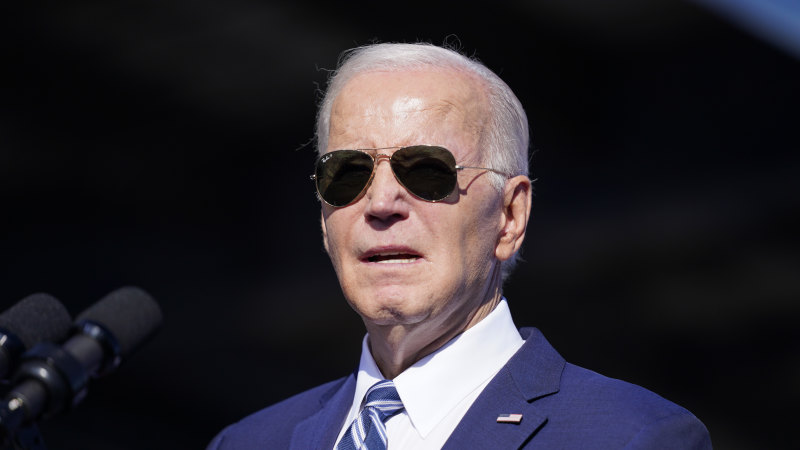Save articles for later
Add articles to your saved list and come back to them any time.
When US President Biden arrives in Israel, he will be flying into an active war zone where hostilities are high and the course and breadth of the war between Israel and Hamas remain extraordinarily unpredictable.
Israel and Hamas have exchanged fierce rocket fire and aerial strikes since Palestinian gunmen from Hamas stormed through the Israel-Gaza border on October 7 and launched the deadliest terrorist attack in Israel’s history, killing more than 1400 Israelis. Israel has launched an aerial counterattack that has killed roughly 3000 people in Gaza and incited outrage across the Middle East.
US President Joe Biden.Credit: AP
Adding to the risks of Biden’s trip was a deadly airstrike on a Gaza hospital on Tuesday that killed at least 500 people, according to the Palestinian Health Ministry.
Palestinian officials say an Israeli airstrike hit the hospital courtyard where displaced Gazans were taking shelter, while the Israel Defence Forces blamed an errant rocket from the Palestinian Islamic Jihad militant group, saying “a barrage of rockets” was passing near the hospital when it was hit.
The hospital bombing has set off fierce protests in the Middle East, including in Jordan, where the Israeli Embassy was surrounded by protesters on Wednesday morning (AEST).
A planned visit by Biden to Amman was cancelled after the strike, forcing the US president to forgo a scheduled meeting with Jordanian King Abdullah II, Egyptian President Abdel Fatah El-Sisi and Palestinian Authority President Mahmoud Abbas.
Air Force One with President Joe Biden aboard takes off at Andrews Air Force Base.Credit: AP
A White House official said Biden “looks forward to consulting in person with these leaders soon, and agreed to remain regularly and directly engaged with each of them over the coming days”.
Some security experts said the physical risk to Biden would be relatively small despite the chaos in the region. Biden is one of the most protected people on the planet, they said, and Air Force One is equipped with sophisticated air defence systems that can thwart incoming rockets and missiles.
“Perhaps the safest plane on Planet Earth is Air Force One,” said Bilal Saab, senior fellow and director of the Middle East Institute’s Defence and Security Program. “Air Force One is perfectly capable of handling any kind of missile launch or rocket launch inside Gaza.”
Still, it’s a rarity for a president to travel directly into a region where hostilities are intensifying, with an Israeli ground incursion into Gaza expected within days and fears that the militant group Hezbollah might enter the fray. Biden faces at least some risk when he is on the ground in Tel Aviv, a city Hamas rockets are able to reach. In Amman, which Biden had planned to visit after his stop in Tel Aviv, the situation remains combustible.
“Being in an active area of hostilities, they have to look very carefully at the threats that Israel is facing now, understanding that the president will be on the ground,” said Jonathan Lord, senior fellow and director of the Middle East Security program at the Centre for a New American Security. “So they’re definitely thinking about Israel’s air defence capabilities and protecting the president from Hamas rockets.”
He added, “By and large, they’re thinking about the same threats that Israelis are now facing on a day-to-day basis.”
Secretary of State Antony Blinken and Defence Secretary Lloyd Austin have both been to Israel since the Hamas attack, providing more assurance that Biden can travel there safely, experts said.
A meeting between Blinken and Israel’s war cabinet this week was interrupted by air sirens warning of incoming rocket fire, sending the top US diplomat and Israeli military officials rushing into a nearby shelter. The dramatic moment underscored the risks that persist with high-level U.S. visits to Israel.
Biden’s visit comes as Israel is expected to launch a ground invasion that it says is an effort to destroy Hamas, potentially setting off one of the worst conflicts in the region in decades. U.S. officials are deeply concerned that the war could spread and draw in such actors as Hezbollah or Iran.
Biden has stressed his ironclad support for Israel since the Hamas attacks, but in recent days, he has sought to strike a more delicate balance between support for Israel’s right to self-defence and concern about civilians in Gaza, where conditions have rapidly deteriorated.
Despite the combustible conditions, the United States has the benefit of Israeli intelligence and air defence capabilities in helping to protect Biden, experts said. Still, that intelligence conspicuously fell short in detecting the Hamas attacks.
Experts said Biden’s trip to Kyiv this year was in some ways more dangerous than the Israel trip because Russia has a far more sophisticated military than Hamas. Although Hamas is arguably a far more unpredictable entity, its militants are unlikely to have the technology or prowess to launch a targeted attack against an American president.
“In terms of threats and risks, Hamas and their capabilities pale in comparison to the Russian military,” Lord said.
For the Kyiv trip, White House officials did not disclose Biden’s whereabouts until he had safely entered the city. In contrast, the president’s trip to Tel Aviv was publicly announced by Blinken on Monday.
Washington Post
More coverage of the Hamas-Israel conflict
- Cascading violence: Tremors from the Hamas attacks and Israel’s response have reached far beyond the border. But what would all-out war in the Middle East look like?
- The human cost: Hamas’ massacre in Israel has traumatised – and hardened – survivors. And in Gaza, neighourhoods have become ghost cities.
- “Hamas metro”: Inside the labyrinthine network of underground tunnels, which the Palestinian militant group has commanded beneath war-ravaged Gaza for 16 years. The covert corridors have long provided essential channels for the movement of weapons and armed combatants.
- What is Hezbollah?: As fears of the conflict expanding beyond Israel and Hamas steadily rise, all eyes are on the militant group and political party that controls southern Lebanon and has been designated internationally as a terrorist group. How did it form and what does Iran have to do with it?
Get a note directly from our foreign correspondents on what’s making headlines around the world. Sign up for the weekly What in the World newsletter here.
Most Viewed in World
From our partners
Source: Read Full Article



